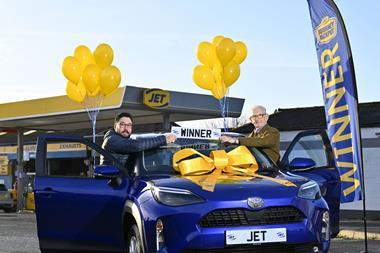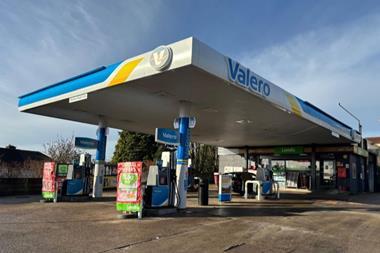There have been SO many developments in car washes in recent years it would be easy to get left behind. The latest technology means that softer brushes, shiny new car wash enclosures and multi-coloured foam are all the rage. And with increasing competition springing up in non-forecourt locations, as well as the - sometimes illegal - hand wash operations, the days of being able to leave your car wash to take care of itself in the corner of the forecourt are long gone.
Today’s car wash can still be a valuable money-making part of a business, but retailers need to maintain the machinery, differentiate their service from that of their rivals, and learn how to market themselves properly if they want to really clean up on profits.
Dawn Frazer, marketing manager at WashTec, says one of the biggest threats to the industry at the moment is the growing popularity of hand wash sites. According to Frazer, customers are choosing to use these sites because they see them as being less likely to scratch or damage their cars than a traditional car wash machine on the forecourt. And it is this perception that retailers must change if they want their business to survive.
She says: "I recently went on a tour of the UK to visit sites with car washes and realised that very few retailers were marketing their car washes very well. There’s a misconception among the public that automatic car washes damage cars. We know that the car wash technology has improved immensely over the past few years, with innovations like SofTecs brushes available for a top quality wash. As long as retailers look after their site and make sure there’s no debris in the brushes, our machines are almost 100% guaranteed to give a perfect wash every time. It is the public’s perception that we need to change."
Next month WashTec is launching a new way to help retailers make more money from their car washes. Called the WashTec File, it will run in two phases. In the first, WashTec representatives will hold a series of one-day seminars around the UK and invite retailers to learn how to improve their business through marketing.
"It’s more than just putting up a banner - it’s about becoming more customer aware," says Frazer.
"It’s important to make your site look good and keep it clean and inviting. It’s about looking at what neighbouring sites have to offer and making yours different."
There will also be specific advice on how to run a loyalty programme, do leaflet drops and how to hold a launch day for a new car wash. The seminars will be free to WashTec customers.
The second phase will concentrate on the professional marketing tools. Frazer says WashTec has negotiated special rates for these. The WashTec File goes live on January 16.
Frazer says: "We’ve decided to launch this because marketing activity is not happening in the marketplace, and it’s so important. No other manufacturers are offering to do this, yet retailers need to market themselves effectively to survive."
Frazer also urges retailers to take advantage of existing laws to close down illegal hand washes.
"Local councils have the powers to enforce the laws already set up," she says. "We’re not saying all hand washes are illegal, but some of them aren’t disposing of their used water properly and that is illegal. If you’re not sure about a local hand car wash, call your local authority and they can look into it for you."
WashTec’s new managing director, Michael Harris, says the growth of the hand wash sector is giving traditional car care businesses a clear message: that the motorist is looking for added value services. He says the industry would be foolish to ignore this message.
"In the future, successful car wash operators will be providing a mix of tailored services - based upon local knowledge they have obtained from their marketing efforts - using both automated equipment and manual processes," says Harris. "Combining these with environmentally responsible, and legal, business practices will safeguard the car wash industry in this country."
Washtec is also calling for the industry to get behind the Car Wash Campaign Group (CWCG), which has been set up to tackle problems in the sector. The group, whose chairman is Parkfoot Garage owner David Charman, has been urging retailers not to give up on their car wash businesses but to join the group and be part of the resurgence of the sector. It also hopes to change the public’s opinion of car washes and promote best practice. The group will be announcing more information for retailers soon.
Other manufacturers agree that the industry needs to join together to fight the threat of illegal hand car washes. Dave Lindon, business development director at car wash manufacturer Istobal, advises retailers to do their homework and make sure they are up to date on the latest legislation. Earlier this year the Environment Agency released a set of pollution prevention guidelines called Vehicle Washing and Cleaning: PPG13. It covers car wash machines and hand washes and outlines how car wash set-ups should dispose of used water and chemicals.
Lindon says: "These guidelines are good for retailers because the agency can check on hand car washes and has the power to close them down if they aren’t being run properly. The hand car wash issue has slowed the market down slightly, but at Istobal we are increasing our market share, so it’s maybe not affecting us so much."
Another hot topic is water recycling in car washes. While hand car washes are prone to being non environmentally-friendly, advances in traditional car washes mean vehicles can get a greener wash at the forecourt because they waste less water. Atlantic International is one manufacturer heavily involved in this area.
The company’s managing director, Peter Spencer, says: "Not only is it good for the planet but it saves on your water bill. If a machine can re-use 95% of the water used in a car wash, then it will save you - the retailer - 95% off your water bill. That’s why there’s so much concern about hand washes. All their dirty water and chemicals just go down the drain."
Spencer believes recycling water in car washes is a trend which will continue to grow.
"In some countries like Germany you can’t wash your car at the side of the road, you have to take it to a car wash centre," he says. "I think that situation will come over to the UK. And companies will have to recycle water. There’s more of a trend towards recycling everything now, and this is no different to recycling cardboard boxes. I think that in five years’ time, all car washes in the UK will need to have some kind of water recycling."
Companies like Atlantis International were given a real boost earlier this year when Defra put its Enhanced Capital Allowance Scheme for Water Technologies policy into action. This means businesses can claim 100% first-year capital allowances on investments in technology and products that encourage sustainable water use. Therefore forecourt operators can write off the whole cost of an investment against their taxable profits during the period in which they make their investment. More information is available at [http://www.eca-water.gov.uk].
Atlantis International is one of the water recycling manufacturers which has registered its products with Defra for the scheme. Spencer estimates that retailers who use it will make a typical saving of about £14,000 - or about 30% of the total cost - on a drought-compliant system, including delivery and installation.
The company sells two main types of water recycling systems: ’total’ systems, which recycle 95% of water used, and ’partial’ systems, which recycle 60%. The total water recycling system from Atlantis, which is the company’s most popular one for forecourts, costs about £12,000, including delivery and installation. The most popular partial water recycling system is £8,000.
Atlantis also distributes Karcher in the UK, and Spencer says its latest rollovers, the CB1 and CB2, are gaining popularity. The CB machines use a common platform, aimed at making servicing easier. The modular nature of the machine means it is ideal for a shorter wash bay. It can also be built inside an existing building. Prices start at about £30,000, with the higher-spec options of the CB2 taking the price up to about £40,000.
Spencer says: "These are very reliable machines and that is important when you run a car wash. If the customer drives in and the car wash is out of use, they’ll go elsewhere. Car washes are very delicate and there are a number of problems that can result from running rollover car washes. They do tend to break down because there is so much involved. But we’ve been selling these Karcher machines this year and they’ve been very successful."
Meanwhile, Istobal also has some new car wash products on the market. The Worcester-based company has been offering an exclusive range of concentrated vehicle wash chemicals from Autoglym since July. Lindon says the sole-supply agreement allows Istobal to give retailers a chance to offer a high-end product to customers. It is also combining the new range with offers to help retailers with promotions.
Lindon says: "We’ve had a lot of interest. As well as giving better results and excellent quality, the concentrates use just 5ml-10ml of chemicals per wash, compared to 40ml for the standard product. It’s also a great experience for the customer because there is more theatre involved, with three coloured foams - red, yellow and blue - applied in stripes. It’s something that can give the retailer a point of difference from their rivals down the road. And there’s no more expense for the retailer or customer."
The company’s optional promotions aim to increase sales for smaller independent retailers. Lindon explains: "For example, if a site buys 250 litres of car wash chemicals from us, we’ll give them four promotions for a year. This could be customers getting a free air freshener if they buy a car wash in spring, a bug remover in summer, screen wash in autumn and de-icer in winter. Sites also have access to banners and signs, the use of the Autoglym brand name and loyalty cards. For a few hundred pounds, we’d expect a business to see a 20% to 40% uplift in the sale of their top washes."
So far three retailers have taken up the new marketing offer, and Istobal is fine-tuning the package and watching how it performs. "Retailers need to set their sites apart from the others in their area," adds Lindon. "The trick is to keep customers loyal to their car wash and their site."
Lindon advises retailers to trade up and add value if they want to really boost their income, by introducing a top wash offer, for example. He says customers typically pay up to £8 for a top wash.
Another trend, says Lindon, is putting car washes inside enclosures.
"Some sites don’t want to spend the money on an enclosure," he says. "But these sites don’t do as much business - if the car wash is in a well-lit, shiny new building, it attracts customers’ attention and they’re more likely to use it. Also, the car wash doesn’t freeze up in the winter."
Istobal’s standard car wash enclosure costs £27,000 but the company estimates that retailers can expect to see a rise of 15% in revenue if their car wash is in an enclosure.
In January, Istobal is launching another new product aimed at smaller independents - a mini tunnel in a ready-built unit. Vehicles go on a conveyor belt through the tunnel, which measures 13.5m and can handle 45 cars per hour. Cars get a pre-wash then, once in the tunnel, there is a foam arch and a series of brushes. It is expected to cost about £60,000.
"A lot of sites simply don’t have enough room - retailers need to allow for at least another 20m of space where vehicles can queue," says Lindon. "But we offer a free site survey to help them find a solution."
The company is also running a special offer on its Ultra Buytime jet wash. The equipment, which offers multi-coloured foam and lets customers choose their own programme of pressure lance and foam brush cleaning, usually retails at £8,000. But Istobal has cut this to £5,500, including installation and one year guarantee. The company says customers get between 2.5 and three minutes per £1 and spend an average of £4 on this jet wash per visit, and retailers should see a return on investment within six months.
Other developments in the market involve better quality wash brushes. Lindon says one of the criticisms with normal soft foam Carlite brushes is that the fibres are quite large and aren’t able to get into the nooks and crannies of a vehicle, so they don’t wash as well as polyethylene brushes. But Lindon says many customers believe - incorrectly - that polyethylene scratches the paint on their cars. Istobal’s new brushes combine Carlite and polyethylene, in a bid to provide a better wash.
Manufacturer WashTec describes its SofTecs brushes as high-quality soft foam brushes which can be fitted to any of its rollovers. In terms of equipment, WashTec has also added some new car-wash offerings to the market this year. Its new SoftWash rollover car washes are aimed at more compact sites and are available in three design options: basic, classic and star, and in a wide range of colours.
The SoftWash aims to offer a gentle but effective wash, including polish and buff service. The price of the SoftWash is site-specific.
WashTec has also released a new range of chemicals onto the market called A1 Synthesis. Products include fragrant hi foam, foamtech shampoo, durofoam polish, drying agent/wax and intense durogloss wax.
The range is said to be environmentally friendly as the products are concentrated meaning the machines use less, while the hifoam and foamtech shampoo are free from all anionic ingredients that give off unpleasant sulphide smells.
Wilcomatic is also looking into making its chemicals more environmentally friendly, and is due to launch a range of biodegradable products made from potato starch next year. The concentrated chemicals are currently being trialled with a major supermarket chain.
Paul Bruen, Wilcomatic business development director, says: "We’ve been concentrating on making our products better for the environment. We’ve also been helping retailers to use rain harvesting for their car washes, after all, the water comes out of the sky, and it’s free so we might as well use it!" The rain water is collected via the forecourt canopies before being stored in huge tanks. Bruen says the systems cost between £1,000 and £30,000 and can save the average site up to 50% off their water bill. Wilcomatic is also trialling wind turbines on car washes.
Meanwhile, on the maintenance side, Istobal recently made some changes with the smaller independent in mind. The company has introduced its Service Plus contract, which costs less than £1,000 per year but offers retailers all the service visits they need while giving them priority breakdown treatment. Lindon says the breakdown service is as fast as with their other, more expensive Platinum and Gold contracts. But with Service Plus, the price tag is kept to a minimum because any parts or labour must be paid for separately by retailers.
At the high-tech end of the market, manufacturers are seeing a growing trend in remote diagnostics. Many modern machines offer remote diagnostics or SMS alerts to let the retailer know about any problems, and this is proving especially useful for multi-site operators who want to monitor an entire network. Atlantis International’s Spencer explains: "With remote diagnostics, the system tells the service provider there is a fault before the machine breaks down or is about to run out of chemicals."
Epos specialist HTEC is also moving into the car wash area and is planning to launch its first range of online valeting products. The group, traditionally a retail petroleum payment and loyalty solutions specialist, will introduce the first phase of its online valeting management service in January. Phase two and three will follow later in 2008. The new products are online systems that look at the data contained in a retailers’ car wash and valeting systems.
HTEC retail division managing director, Darren Graham, says: "This is the first product of its kind on the market. It interrogates the actual cash count of revenue, so the retailer can see the cash going through the machines, or through multiple machines on multiple sites. The information is updated every 60 seconds, so it’s real-time data. It can do this for machines using tokens or money. So instead of looking through the accounts, retailers can get information on email or text alerts. This will eventually cover the car wash, jet wash, car vacuum and air towers." Phase one has been developed and tested and is being trialled on a supermarket site in the north of England, and so far feedback is excellent, says Graham.
As well as monitoring the cash intake of machines, the system can also send a security alert when the cash in a machine reaches a certain limit, so the machine can be emptied. Phase two, due to be rolled out by April, provides more remote diagnostics interrogation.
Graham says: "The system will know it has failed or is about to fail before the site does. Our aim is to prevent engineers needing to visit the site so much. It also offers alerts when chemicals need topping up and can monitor car wash quality."
Phase three will be available in the third quarter of 2008 and will provide more "detailed analytics", according to Graham. "Retailers will be able to get vital information about every working component on their machines," he says. "It’s hugely analytical, including timers, programmable logic computers, water and electrics."
The product can be rented or bought outright with retailers paying for the amount of information they receive. Graham expects the most basic system to be rented to a site for between £25 and £30 a month.
But whatever equipment or technology you choose, one of the most important aspects according to industry experts is one of the most simple to achieve: keep the car wash bay clean and tidy.
Atlantis’s Spencer explains: "Some retailers might splash out up to £40,000 on a car wash but leave it looking dirty and tatty. The car wash needs to be checked every day because customers drop stuff in the bay, while bits of aerial break off and litter is dumped. Not only does it look scruffy and put people off, but it can damage the car wash and cars. Some people have a bad perception of car washes. But keeping them clean and tidy will encourage people to use them."
Spencer advises giving car washes a pre-winter check. This should include checking the brushes are in good order, and if customers pay for the car wash with a ticket or token, making sure that the interface is working well. He adds: "Don’t drive customers away with a shabby car wash, or one that isn’t working properly."
----
=== A closer look at the PPG 13 ===
In July the Environment Agency issued its pollution-prevention guidelines for vehicle washing and cleaning.
These cover automatic wash systems, car washing by hand and the use of high-pressure or steam cleaners.
The PPG 13 states:
? Don’t allow washing or cleaning effluent, run-off or cleaning chemicals to enter drains or gullies connected to the surface water drainage system.
? Never carry out washing or cleaning on unmade ground or other porous surfaces where run-off could soak through the soil and pollute ground-water resources.
? Activities that produce run-off from the vehicle to the ground and use cleaning and valeting products should be carried out in areas that are clearly marked and in isolated designated washing bays. Run-off should be isolated using channels, gullies, gradient and kerbs and should be directed to a silt trap or settlement tank to remove bigger particles of silt and sediment. Water should be either collected in a sealed system for re-use, discharged to the public sewer with prior permission from the local sewer provider or collected in a sealed system for authorised disposal.
? Look at ways to recycle and reduce the water used.
? Produce a spillage response plan; test and use it.
? When washing and valeting by hand, you must have good site management procedures and practices in place to avoid pollution. Designated wash bays must be used, or other arrangements must be in place, such as using no chemicals in the water or collecting, treating or disposing of the run-off legally.
? For more information, log onto [http://www.environment-agency.gov.uk/ppg]. For Scotland, log onto [http://www.sepa.org.uk/publications/leaflets/suds/index.htm].
Or call the Environment Agency on 01454 624400 or the Scottish Environment Protection Agency on 01786 457700.
----
=== Top Tips ===
? Get your machines checked regularly - once every couple of months - including a full maintenance check before the winter. Check everything is working properly.
? Make sure the car wash area is well lit. WashTec’s Dawn Frazer says: "Nobody wants to go to the car wash area if it’s dimly lit - this is especially true for women. They will go somewhere else which is better lit and looks more professional and secure."
? Make sure the bays are clean and the general area is inviting. Do one 15-minute maintenance check every day and clean off any litter from the bay or the brushes. This will make the car wash look more appealing while cutting the risk of vehicles being scratched by any debris on the brushes.
? Learn how to market your car wash. You need to tell your customers where it is, what it does and about any new features or special offers. You can’t expect it to sell itself.
? Keep an eye on the competition. If you don’t know what’s around, how can you expect to offer a better service and attract their customers?
----
=== Case Study - David Charman, Parkfoot Garage ===
David Charman believes the way to make a healthy profit out of your car wash is to offer a premium service with plenty of added extras.
David’s main car wash site is in West Malling, Kent, where he has two rollover units, handling about 600 washes a week between them, and two jet washes, bought through WashTec. From his experience, customers want a premium wash - and are willing to pay a premium price to get it.
"The days of just putting in the equipment and leaving it to take care of itself are over - you can’t do that any more," says David, who is also chairman of the Car Wash Campaign Group (CWCG).
"You’ve got to talk to your supplier and ask them to help you market the car wash.
"And while some people say we need to be moving towards washing cars as fast as possible, I disagree. For me personally, the trend has been about getting the best equipment and the best chemicals and to produce the best premium wash we can. I think that’s what customers really want. They need to see some added value, they want a good and professional job done."
He adds that the car wash and valeting sector can be a very profitable area of business, but it needs to be done professionally if retailers want to compete with other businesses. The consumer needs to feel the forecourt is the place to go for a proper car wash.
He says: "Replacing your machine car wash with a hand wash business is not the way to go. Just look at the latest equipment out there and the return on investment. If we market these things properly, I believe there is great potential to run a profitable car wash business on the forecourt."
David says there are plenty of ways to make money on a car wash business - for example the added extras.
At his West Malling site, a customer can pre-wash their vehicle’s wheels before it goes into the rollover. They put 50p in a machine and they can spray the wheels with a chemical through a wand. After the top wash - which costs £8 - they can pay another 50p for a synthetic chamois leather to wipe their car down with, and an extra 20p for two pieces of absorbent paper to clean the car door openings.
This potentially adds another £1.20 to the wash. According to David, 35% of people use the pre-wash for their wheels. The cloths are also placed near the jet washes, encouraging customers to spend an extra 50p here too rather than to drive their car away wet. Then there’s the vacuum at £1 for six minutes.
David says: "There’s the potential to offer the whole lot at a set, discounted price. It’s like the equivalent of a meal deal."
David also saves money on his water bills after getting a bore-hole installed on his forecourt - it now supplies all the water to his car wash business. It took a year to make the money back on the cost of getting the bore-hole installed.
"You can take up to 20,000 litres a day without a licence," says David. "But it’s not rocket science - it’s something other people should definitely look at."



























No comments yet